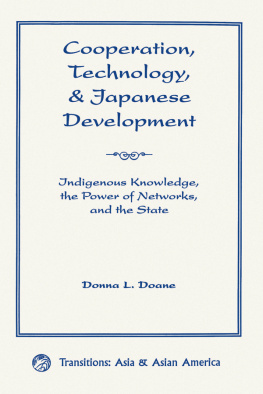Transitions: Asia and Asian America
First published 1999 by Westview Press
Published 2018 by Routledge
711 Third Avenue, New York, NY 10017, USA
2 Park Square, Milton Park, Abingdon, Oxon OX14 4RN
Routledge is an imprint of the Taylor & Francis Group, an informa business
Copyright 1998 Taylor & Francis
All rights reserved. No part of this book may be reprinted or reproduced or utilised in any form or by any electronic, mechanical, or other means, now known or hereafter invented, including photocopying and recording, or in any information storage or retrieval system, without permission in writing from the publishers.
Notice:
Product or corporate names may be trademarks or registered trademarks, and are used only for identification and explanation without intent to infringe.
A CIP catalog record for this book is available from the Library of Congress
ISBN 13: 978-0-8133-3737-1 (pbk)
ISBN 13: 978-0-8133-8731-4 (hbk)
In developing countries as well as advanced industrial countries, the issue of cooperative technological ties has been recognized in recent years as an important means to broaden the technological capabilities of enterprises and counter the limitations of atomistic and individualistic organizations. Cooperative technological ties can be encouraged on a number of different levels: e.g., ties can be fostered among microenterprises, NGOs, and other organizations in contexts that are very far from the technological frontier, or they can be used by private and public enterprises that are close to or at the frontier. The goal in either case is to move beyond the limitations of the existing knowledge and experiences embodied in individual, relatively isolated organizations.
This study is an outgrowth of an inquiry into questions of technological advance that first began in the late 1970s and early 1980s in the form of empirical dissertation research. At that time Japan was beginning to be recognized as a world class producer of altogether new and originali.e., frontiertechnologies. It was a time when many were still debating whether Japanese researchers and technicians were capable of carrying out original and creative technological innovations, as opposed to simply being good at the application of others ideas.
At that time, the VLSI project and its breakthroughs began to dramatically alter perceptions of Japans technological strengths. In this context, I decided to examine the ways in which firms in Japan were able to pool their knowledge and resources to first catch up technologically, and then undertake frontier forms of innovation: this case study material is presented throughout the present study, but particularly in the middle chapters ().
Unfortunately but predictably, after the VLSI and other technological breakthroughs in Japan, the siren was sounded that other advanced industrial countries were likely to lose the technology wars in industry after industry to the Japanese. Many of the ensuing discussions and debates about industrial and technology policies, and many of the political commentaries about the Japanese Systemparticularly as reflected in media pronouncements during trade negotiationswere exaggerated and inflammatory, and incited bitter feelings on both sides of the Pacific.
Put off by this climate, I did not want to participate in these debates, and turned to other concerns. Over time, however, I began to examine both more historical and comparative aspects of these issues, and decided to place the case studies in a broader comparative framework. My work in India and Thailand also underscored for me the importance of the promotion of cooperative technological ties across the economy, both to help develop and integrate the local (indigenous) knowledge and technology base (including, in some cases, technology blending), and to support a wide spectrum of local organizations and enterprises (both the less and the more technologically advanced of these). The need for local solutions to deal with local problemsi.e., in a way that is in tune with the specific conditions of the local social, economic and ecological settinghas become particularly acute in recent years.
In addition, the vulnerability and boom/bust patterns associated with countries that have not emphasized the development and integration of the local technology and knowledge base, and instead have had to rely excessively on imported capital and technologies, have for me reinforced the need for a relatively stable, egalitarian, and well-integrated economic and technological environment that serves local needs more effectively. Cooperative ties that create technological networks across the economy can be promoted equally within market socialist, cooperative capitalist, and other forms of late developing economies, as will be illustrated through examples cited in below.
We will begin this discussion with a detailed study of the evolution and recent forms of cooperative technological ties in Japan. This work will on one level complement other studies that have been made of industrial policy, the government-industry relationship, and enterprise behavior in Japan. Studies to date dealing with cooperative R&D in Japan have tended to focus primarily on government-sponsored large-scale projects involving cooperation between competitors (i.e., one specific type of intra-industry cooperation), as these have been the projects of particular interest to the advanced industrial countries (no doubt this interest was fueledin the U.S. at leastby the fact that many private enterprises as well as policy makers have been interested in a loosening of antitrust laws and increased government financial support). I have included references to these studies, particularly in the discussion sections of belowi.e., the chapters presenting case studies that illustrate intra-industry cooperative ties.
One set of issues that has been of particular interest to advanced ) is particularly relevant to these issues, and may be of interest to those concerned with the keiretsu debates.
It is important to keep in mind that the primary focus of the present study is the range and evolution of cooperative technological ties in Japan up through the early 1980s, and particularly during the postwar catch up and early frontier periods of technological advance (roughly, the 1960s through the early 1980s). Thus, it provides a discussion of the historical context, along with empirical research that may help illuminate both the keiretsu (group) and government-industry sets of issues that have been of particular concern to the advanced industrial countries.
My main concern, however, has been to explore the use of cooperative ties for technological advance during the period of technological catch up, specifically within a late development context. These issues have direct relevance to the aspirations of many developing countries, whether socialist, capitalist, or somewhere in between. For better and for worse, technological advance, the development of indigenous technological strengths, and relative technological self-reliance (i.e., learning from, but not being continually dependent on imported ideas and technologies) are goals of a large number of developing countries today. Many in these countries are, in fact, trying to learn from the development experiences of Japan and the East Asian NICs as an alternative to the early industrializing examples, without necessarily trying to head in the same direction. Many of the late developers have institutional characteristics that are similar to those present in Japan during the earlier stages of its industrial development, such as dualistic (or multistructured) industrial structures, enterprise groupings, and certain aspects of the government-industry relationship that have interesting parallels to conditions in prewar and early postwar Japan. Thus, Japans experienceillustrating both the possibilities for and potential problems associated with different forms of cooperative technological tiesis particularly relevant to the development experiences of many of these countries. It is argued that cooperative technological ties in this context can be used, under the right circumstances, for socially beneficial purposes with widespread applications, and not simply to give individual enterprises a competitive edge, even though they certainly can do this as well.












